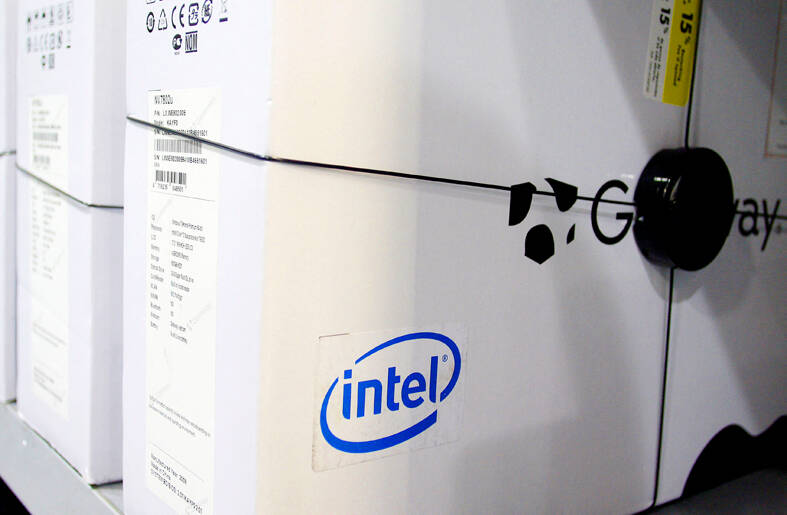Semiconductor giant Intel Corp and PC brand Asustek Computer Inc (華碩) have agreed to team up to manufacture, sell and support new generations of the Next Unit of Computing (NUC) line of mini-PCs.
NUCs are a line of small computers designed by Intel that are small enough to be held in one hand, but still pack the power and utility of a complete computer system. They function like a PC, and are used with a mouse, keyboard and monitor or other types of screens.
In a statement released overnight, Intel said the two companies have agreed to a term sheet to take the Intel NUC product line forward.

Photo: Reuters
Intel said Asustek’s expertise and track record delivering industry-leading mini-PCs to customers makes it ideally suited to continue driving innovation and growth in NUC products.
The partnership came after Intel announced earlier this month that it plans to stop “direct investment” in its NUC line, but said the company aimed to change its strategy to enable its ecosystem partners to continue innovating the mini-PCs.
Under the agreement, Asustek is to receive a non-exclusive license to Intel’s NUC designs, enabling it to produce and sell 10th to 13th-generation NUC systems, as well as develop future designs.
In addition, Asustek is to launch a new business unit called Asus NUC BU to provide product and support continuity for Intel NUC customers.
“As we pivot our strategy to enable ecosystem partners to continue NUC systems product innovation and growth, our priority is to ensure a smooth transition for our customers and partners,” Intel vice president and Intel Client Platform Solutions general manager Sam Gao (高嵩) said in the statement.
“I am looking forward to Asus continuing to deliver exceptional products and supporting our NUC systems customers,” he said.
Also in the statement, Asustek chief operating officer Joe Hsieh (謝明傑) said the partnership would have benefits for his company’s PC development.
“I am confident that this collaboration will enhance and accelerate our vision for the mini-PC — greatly expanding our footprint in areas such as AI [artificial intelligence] and AIoT [AI of Things],” Hsieh said.

US sports leagues rushed to get in on the multi-billion US dollar bonanza of legalized betting, but the arrest of an National Basketball Association (NBA) coach and player in two sprawling US federal investigations show the potential cost of partnering with the gambling industry. Portland Trail Blazers coach Chauncey Billups, a former Detroit Pistons star and an NBA Hall of Famer, was arrested for his alleged role in rigged illegal poker games that prosecutors say were tied to Mafia crime families. Miami Heat guard Terry Rozier was charged with manipulating his play for the benefit of bettors and former NBA player and

The DBS Foundation yesterday announced the launch of two flagship programs, “Silver Motion” and “Happier Caregiver, Healthier Seniors,” in partnership with CCILU Ltd, Hondao Senior Citizens’ Welfare Foundation and the Garden of Hope Foundation to help Taiwan face the challenges of a rapidly aging population. The foundation said it would invest S$4.91 million (US$3.8 million) over three years to foster inclusion and resilience in an aging society. “Aging may bring challenges, but it also brings opportunities. With many Asian markets rapidly becoming super-aged, the DBS Foundation is working with a regional ecosystem of like-minded partners across the private, public and people sectors

BREAKTHROUGH TECH: Powertech expects its fan-out PLP system to become mainstream, saying it can offer three-times greater production throughput Chip packaging service provider Powertech Technology Inc (力成科技) plans to more than double its capital expenditures next year to more than NT$40 billion (US$1.31 billion) as demand for its new panel-level packaging (PLP) technology, primarily used in chips for artificial intelligence (AI) applications, has greatly exceeded what it can supply. A significant portion of the budget, about US$1 billion, would be earmarked for fan-out PLP technology, Powertech told investors yesterday. Its heavy investment in fan-out PLP technology over the past 10 years is expected to bear fruit in 2027 after the technology enters volume production, it said, adding that the tech would

YEAR-END BOOST: The holiday shopping season in the US and Europe, combined with rising demand for AI applications, is expected to drive exports to a new high, the NDC said Taiwan’s business climate monitor improved last month, transitioning from steady growth for the first time in five months, as robust global demand for artificial intelligence (AI) products and new iPhone shipments boosted exports and corporate sales, the National Development Council (NDC) said yesterday. The council uses a five-color system to measure the nation’s economic state, with “green” indicating steady growth, “red” suggesting a boom and “blue” reflecting a recession. “Yellow-red” and “yellow-blue” suggest a transition to a stronger or weaker condition. The total score of the monitor’s composite index rose to 35 points from a revised 31 in August, ending a four-month